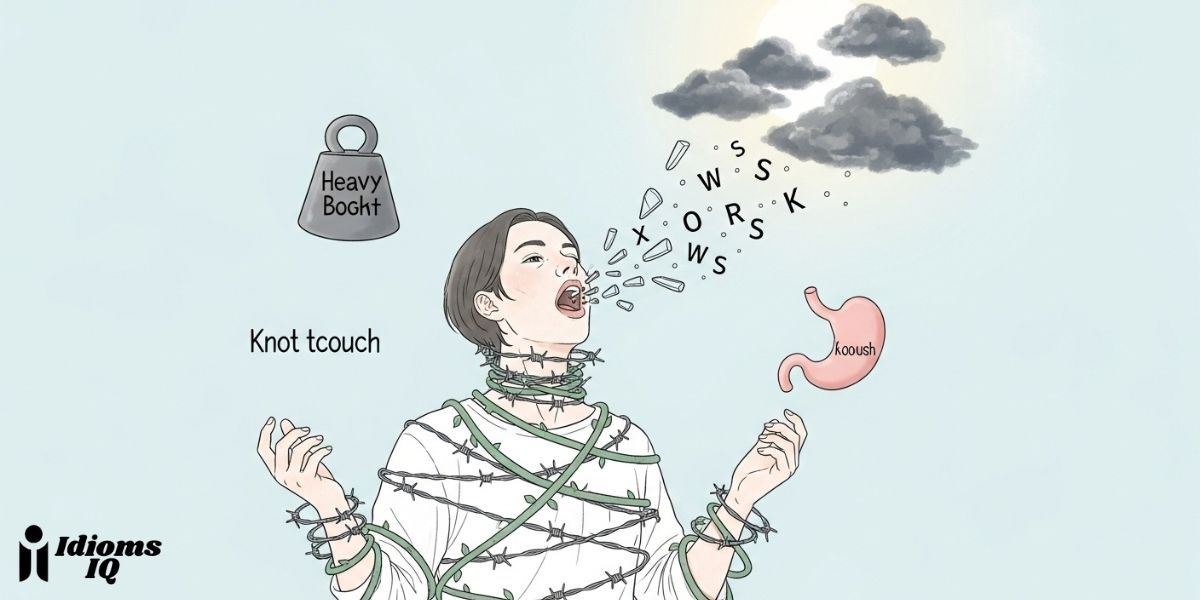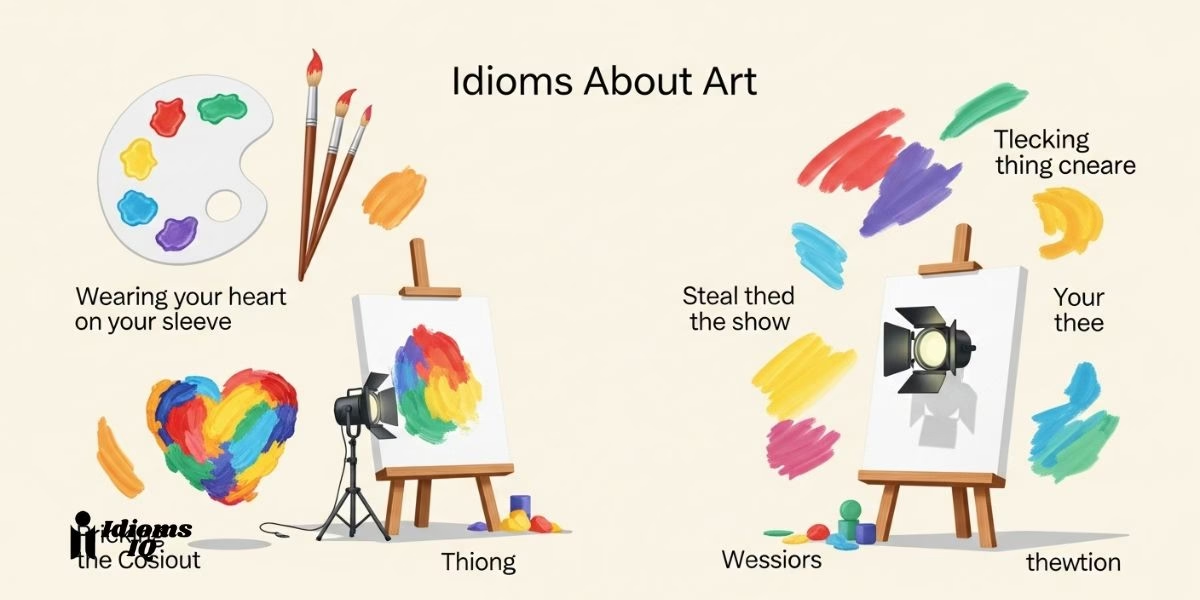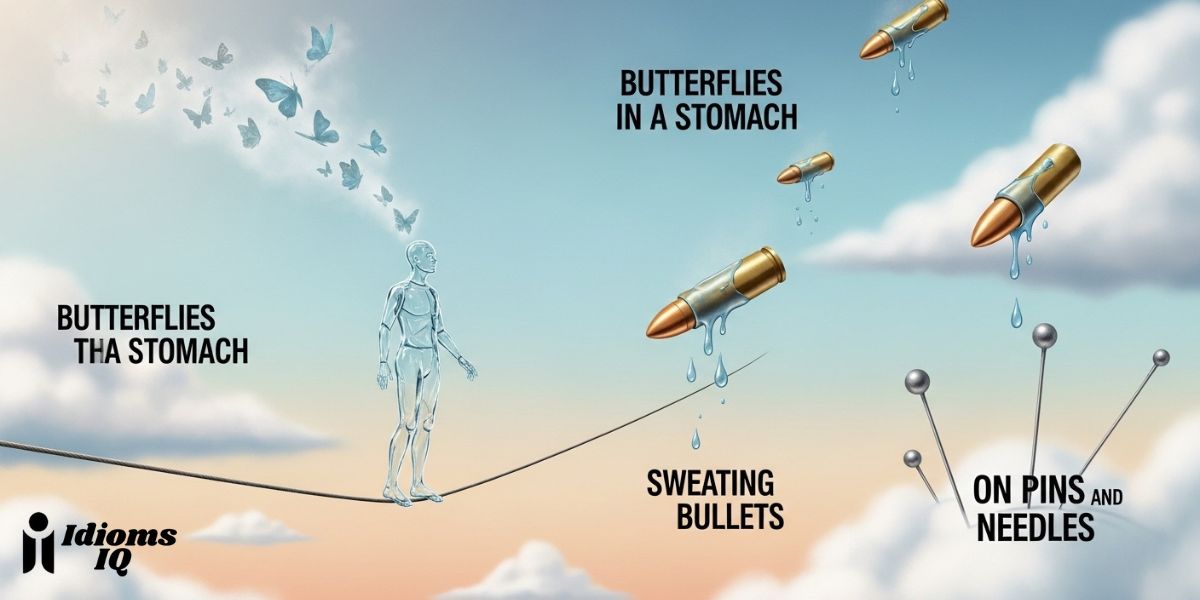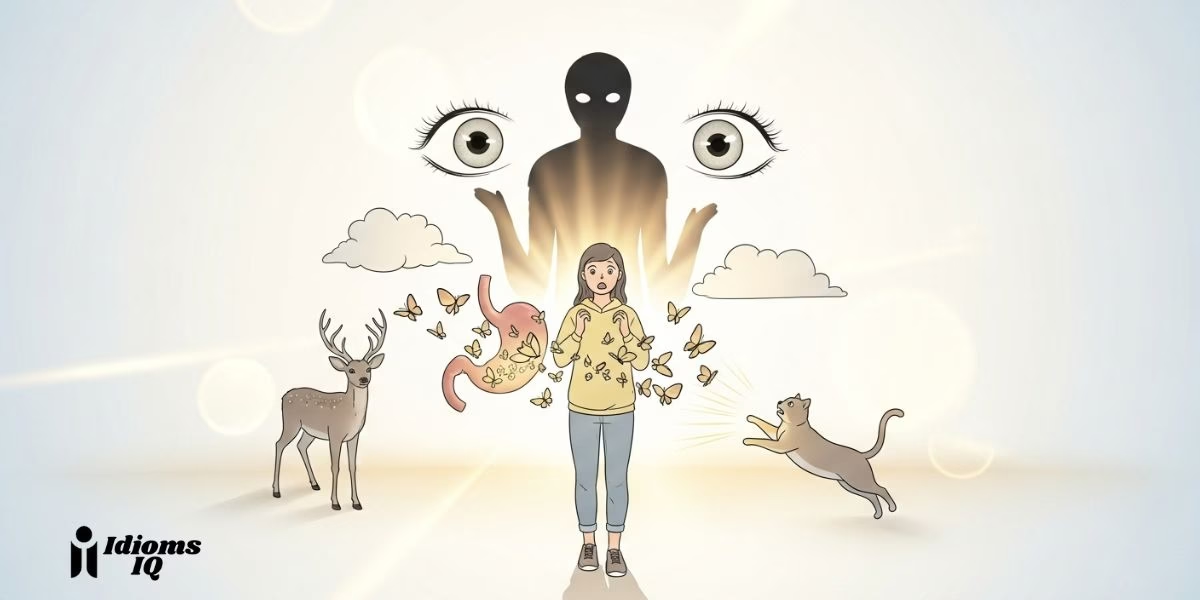
Language is a vast and vibrant landscape, and within it, idioms stand out as unique landmarks. These phrases, whose meanings can’t be understood from the literal definitions of their words, act as concentrated capsules of emotion, history, and shared experience. They are more than just linguistic shortcuts; they are powerful tools that allow us to communicate complex, abstract ideas with striking clarity.
When we talk about feeling scared, whether it’s a slight unease or a profound terror, idioms provide a rich tapestry of expressions. From a sudden jump to a persistent anxiety, these figurative phrases help us articulate the intense feelings that accompany fear. This article will serve as your go-to guide, offering an explanation for 40 unique idioms for scared and highlighting how they can bring a newfound vibrancy to your writing and conversations about fear.
Why We Use Idioms for Fear
The feeling of fear is visceral and powerful, but it’s often difficult to describe with simple words. Idioms for fear are a creative tool because they connect the abstract feeling of terror or nervousness to something tangible and relatable. They help us evoke emotion, describe the physical sensations of being nervous, and make ideas that are hard to grasp, like a sudden panic, much more understandable.
They give us a new vocabulary for our fears, moving us beyond a simple “I was scared” into more vivid storytelling. Just as a painter uses a certain color to convey dread, you can use these idioms to add depth and nuance to your language.
Related: Similes for Scared
Best Idioms for Scared
1. Butterflies in one’s stomach
- Meaning: A fluttering sensation in the stomach, indicating a feeling of nervousness or excitement before an important event.
- Use in a sentence: Before her big presentation, she had butterflies in her stomach.
- Additional context: This is a very common idiom used to describe mild to moderate anxiety.
2. On pins and needles
- Meaning: To be in a state of anxious suspense or eager anticipation, often feeling restless.
- Use in a sentence: We were all on pins and needles waiting for the exam results.
- Additional context: This phrase conveys a sense of tense, nervous anticipation.
3. Have cold feet
- Meaning: To feel nervous or hesitant about doing something one had planned, often at the last minute.
- Use in a sentence: He was about to propose, but he had cold feet and backed out.
- Additional context: This idiom is most commonly associated with a person’s hesitation before marriage.
4. Break into a cold sweat
- Meaning: Suddenly becoming very nervous or frightened, often accompanied by physical perspiration.
- Use in a sentence: The thought of public speaking makes me break into a cold sweat.
- Additional context: This is a great expression for a physical reaction to fear.
5. Have one’s heart in one’s mouth
- Meaning: To feel extremely nervous or frightened, as if one’s heart is pounding so hard it’s about to jump out.
- Use in a sentence: When the car swerved, my heart was in my mouth.
- Additional context: This idiom powerfully expresses a sudden and intense fear.
6. Shake like a leaf
- Meaning: To tremble uncontrollably due to extreme nervousness, fear, or cold.
- Use in a sentence: Before her performance, she was shaking like a leaf.
- Additional context: This is a highly visual idiom that paints a clear picture of physical terror.
7. Get the jitters
- Meaning: To feel suddenly nervous or anxious, often with slight trembling or restlessness.
- Use in a sentence: He always gets the jitters right before a big presentation.
- Additional context: This phrase is a common way to describe a brief burst of nerves.
8. Be on edge
- Meaning: To be nervous, irritable, or easily agitated due to stress or anticipation.
- Use in a sentence: She’s been on edge all week waiting for the test results.
- Additional context: This phrase describes a state of prolonged, low-level anxiety.
9. Walk on eggshells
- Meaning: To be extremely careful and cautious in one’s actions or words to avoid upsetting someone or causing trouble, often due to nervousness.
- Use in a sentence: Everyone in the office was walking on eggshells around the angry boss.
- Additional context: This idiom is often used to describe a tense or delicate social situation.
10. Have a knot in one’s stomach

- Meaning: A tight, uncomfortable feeling in the stomach due to anxiety or nervousness.
- Use in a sentence: He had a knot in his stomach before asking for a raise.
- Additional context: This phrase is a great way to describe the physical sensation of anxiety.
11. Feel a lump in one’s throat
- Meaning: A sensation of tightness or obstruction in the throat, often caused by strong emotion like sadness or nervousness, making it hard to speak.
- Use in a sentence: As she stood to give her speech, she felt a lump in her throat.
- Additional context: This is a classic idiom for feeling overwhelmed with emotion.
12. Be a bundle of nerves
- Meaning: To be extremely nervous and anxious, often visibly so.
- Use in a sentence: Before the wedding, the groom was a complete bundle of nerves.
- Additional context: This phrase vividly describes someone who is a physical manifestation of anxiety.
13. Get weak in the knees
- Meaning: To feel suddenly faint, unsteady, or overwhelmed, usually due to fear or excitement.
- Use in a sentence: The sight of blood always makes me get weak in the knees.
- Additional context: This idiom describes a physical reaction to a strong emotional or sensory trigger.
14. On tenterhooks
- Meaning: To be in a state of anxious suspense or eager anticipation, often feeling restless.
- Use in a sentence: The whole family was on tenterhooks waiting for the doctor’s call.
- Additional context: This is a very old idiom that still perfectly describes a tense waiting period.
15. Have one’s stomach churn
- Meaning: An uncomfortable, uneasy sensation in the stomach, often associated with anxiety or disgust.
- Use in a sentence: The thought of the difficult conversation made her stomach churn.
- Additional context: This idiom is a good alternative to “butterflies in one’s stomach,” often with a more negative connotation.
16. Lose one’s cool
- Meaning: To become agitated, angry, or flustered, losing one’s composure due to stress or pressure.
- Use in a sentence: Under the intense scrutiny, the politician started to lose his cool.
- Additional context: This phrase describes a loss of emotional control that often stems from anxiety.
17. Be jumpy
- Meaning: To be easily startled or nervous, often reacting suddenly to small things.
- Use in a sentence: After watching the horror movie, she was jumpy all night.
- Additional context: This is a simple but effective adjective to describe a state of nervousness.
18. Be apprehensive
- Meaning: To feel anxious or fearful that something bad or unpleasant will happen.
- Use in a sentence: He was apprehensive about the upcoming surgery.
- Additional context: This is a more formal term for a feeling of uneasiness.
19. Have a sinking feeling
- Meaning: An unpleasant sensation in the stomach or chest, indicating a growing sense of dread or disappointment.
- Use in a sentence: As the plane began to shake, I had a sinking feeling in my stomach.
- Additional context: This idiom describes a profound sense of foreboding.
20. Bite one’s nails
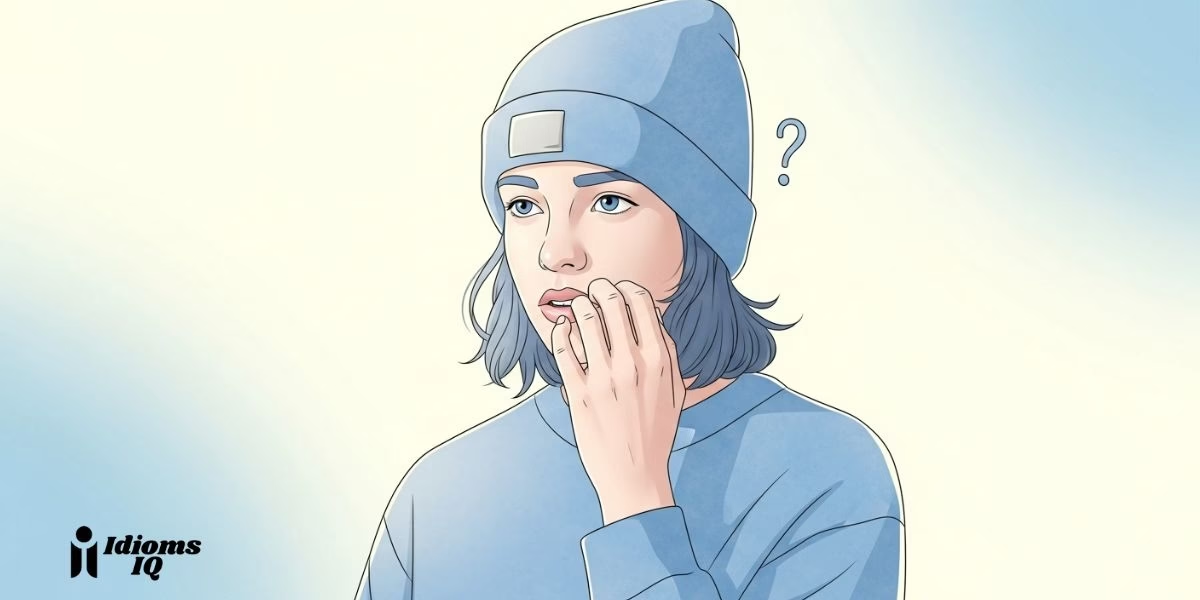
- Meaning: A common nervous habit, indicating anxiety, stress, or deep thought.
- Use in a sentence: He started to bite his nails as the deadline approached.
- Additional context: This is a physical action that is a universal sign of nervousness.
21. Be in a cold sweat
- Meaning: To be in a state of intense fear or anxiety, often causing one to perspire heavily.
- Use in a sentence: He woke up in a cold sweat after the nightmare.
- Additional context: This idiom describes a state of intense, almost paralyzing fear.
22. Have a frog in one’s throat
- Meaning: A temporary hoarseness or difficulty speaking, often due to nervousness.
- Use in a sentence: He cleared his throat, feeling a frog in his throat before his speech.
- Additional context: This is a classic idiom for the physical effects of pre-performance anxiety.
23. Be jittery
- Meaning: Feeling nervous, restless, or shaky, often with small, rapid movements.
- Use in a sentence: After drinking too much coffee, he was feeling quite jittery.
- Additional context: This idiom describes a high-energy, restless form of nervousness.
24. Jump out of one’s skin
- Meaning: To be extremely startled or frightened by something.
- Use in a sentence: The sudden loud noise made me jump out of my skin.
- Additional context: This is a very common and dramatic idiom for a sudden fright.
25. Have one’s hair stand on end
- Meaning: To be extremely frightened or terrified, causing a physical sensation of one’s hair rising.
- Use in a sentence: The scary story made my hair stand on end.
- Additional context: This is a great descriptive idiom for intense fear or a scary situation.
26. Get goosebumps
- Meaning: To have the small bumps on one’s skin that are a physical reaction to cold, fear, or strong emotion.
- Use in a sentence: The horror movie was so intense that it gave me goosebumps.
- Additional context: This is a universal physical sign of being scared or moved.
27. Be a nervous wreck
- Meaning: To be extremely anxious, stressed, and exhausted due to prolonged nervousness.
- Use in a sentence: After weeks of worrying, she was a nervous wreck.
- Additional context: This phrase describes someone who has been completely overwhelmed by anxiety.
28. Have clammy hands
- Meaning: To have hands that are cold and sweaty due to nervousness or fear.
- Use in a sentence: Before his first date, he noticed he had clammy hands.
- Additional context: This is a classic physical symptom of nervousness.
29. Be shaky
- Meaning: Feeling unsteady, weak, or trembling, often due to nervousness, fear, or illness.
- Use in a sentence: After the near-accident, his hands were still shaky.
- Additional context: This is a simple but effective adjective to describe physical nervousness.
30. My heart skipped a beat

- Meaning: A sudden feeling of surprise, excitement, or fear.
- Use in a sentence: When I saw the message, my heart skipped a beat.
- Additional context: This phrase is often used to describe a sudden, intense emotional shock.
31. My knees were knocking
- Meaning: To be so nervous or scared that one’s legs are shaking.
- Use in a sentence: Before my big presentation, my knees were knocking from nerves.
- Additional context: This idiom is a good way to describe the physical effects of nervousness.
32. My stomach dropped
- Meaning: A sudden, unpleasant sensation of fear or surprise.
- Use in a sentence: When I heard the bad news, my stomach dropped.
- Additional context: This idiom describes a sudden, profound feeling of shock or dread.
33. To have a fright
- Meaning: To feel a sudden and intense fear.
- Use in a sentence: The spider gave me a big fright.
- Additional context: This is a simple phrase for a sudden, unexpected scare.
34. Get stage fright
- Meaning: Nervousness or anxiety experienced by a performer before appearing in front of an audience.
- Use in a sentence: Despite years of acting, she still gets stage fright before every show.
- Additional context: This is a specific and widely understood term for performance anxiety.
35. A scaredy-cat
- Meaning: Someone who is easily frightened or timid.
- Use in a sentence: My little brother is a scaredy-cat and won’t watch horror movies.
- Additional context: This is a common and playful insult for a person who is easily scared.
36. A quivering wreck
- Meaning: Someone who is extremely nervous and shaking with fear.
- Use in a sentence: After the car accident, he was a quivering wreck.
- Additional context: This idiom is a good way to describe a state of emotional and physical shock.
37. My heart was pounding
- Meaning: To have one’s heart beat very fast due to fear, excitement, or nervousness.
- Use in a sentence: My heart was pounding as I walked through the dark hallway.
- Additional context: This is a classic physical symptom of fear.
38. A chilling feeling
- Meaning: A feeling of fear or apprehension that makes one feel cold.
- Use in a sentence: The deserted house gave me a chilling feeling.
- Additional context: This phrase often describes a sense of eerie fear.
39. To have the heebie-jeebies
- Meaning: A feeling of nervousness, fear, or a creepy sensation.
- Use in a sentence: That old doll gave me the heebie-jeebies.
- Additional context: This is a fun, informal term for a spooky or creepy feeling.
40. Afraid of one’s own shadow

- Meaning: To be extremely timid and easily frightened, even by things that are not a real threat.
- Use in a sentence: After the haunted house, she was so jumpy she was afraid of her own shadow.
- Additional context: This is a classic hyperbolic phrase for someone who is overly fearful.
Practice Your New Vocabulary: Fill in the Blanks
Complete the following sentences with the most appropriate idiom from the article.
- Before her first solo performance, she had ______________.
- We were all ______________ waiting for the exam results.
- He almost backed out of the skydiving trip because he ______________.
- The sudden loud noise made me ______________.
- My ______________ as I walked through the dark hallway.
- The new manager was so strict that everyone in the office was ______________ around him.
- She always ______________ before job interviews, even though she’s highly qualified.
- He was a complete ______________ before his big presentation.
- When the car swerved, my ______________.
- The horror movie was so intense that it gave me ______________.
Answer Key
- butterflies in her stomach
- on pins and needles
- had cold feet
- jump out of my skin
- heart was pounding
- walking on eggshells
- gets the jitters
- bundle of nerves
- heart was in my mouth
- goosebumps
Conclusion:
As this journey through 40 scared idioms shows, our language is a powerful vehicle for expressing the profound and often complex emotions we experience. From a simple “bundle of nerves” to a more figurative “hair stood on end,” these idioms give us the ability to articulate our fear, anxiety, and apprehension.
They are essential tools for a rich vocabulary, allowing us to move beyond the literal and express ourselves with creativity and emotion. By practicing and incorporating these phrases for fear and expressions into your daily language, you can significantly enhance your writing skills and conversational confidence.
Learning idioms is a continuous process of discovery, much like life itself. We encourage you to use this article as a thesaurus to explore more expressions and bring your thoughts to life.

